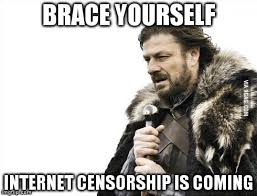When Can a Politician Block Constituents on Social Media?–Garnier v. O’Connor-Ratcliff
 This case involves a school district near San Diego. The plaintiffs are parents of kids in the school district. The defendants, O’Connor-Ratcliff and Zane, are elected school board members. The defendants blocked the plaintiffs on social media. In light of the landmark Knight v. Trump ruling, those blocks may be unconstitutional censorship. After a bench trial, the court concludes that the defendants did indeed censor the plaintiffs, but ruling is bounded by factual caveats and intervening technological developments.
This case involves a school district near San Diego. The plaintiffs are parents of kids in the school district. The defendants, O’Connor-Ratcliff and Zane, are elected school board members. The defendants blocked the plaintiffs on social media. In light of the landmark Knight v. Trump ruling, those blocks may be unconstitutional censorship. After a bench trial, the court concludes that the defendants did indeed censor the plaintiffs, but ruling is bounded by factual caveats and intervening technological developments.
The defendants testified that they viewed their social media accounts as “one-way communication from themselves to their constituents.” In other words, the defendants like broadcasting their views but not so much hearing back from constituents. However, social media’s raison d’etre is to spur conversations, so their broadcast-only objective seems mislocated. Since the case started, Twitter now allows users to turn off replies to their tweets, which creates the broadcast-only capability the defendants really wanted.
The plaintiffs “spammed” the defendants’ social media with repetitive comments. In one case, a plaintiff posted the same comment on 42 different Facebook posts of a defendant, in another, a plaintiff replied with the same comment to every single tweet by a defendant–226 replies in total. The defendants deleted or hid some of those Facebook comments. Furthermore, one defendant blocked the plaintiffs at Facebook. The other defendant reported some of the plaintiffs’ comments, but Facebook didn’t take any action on those reports. However, Facebook recommended a block (in context, a terrible recommendation), which the defendant did; and this defendant blocked one of the plaintiffs at Twitter as well.
The court summarizes the legal issue: “whether Plaintiffs’ repetitive comments and replies on Defendants’ social media pages actually disrupted Defendants’ original posts, making Defendants’ blocking a reasonable time, place, or manner restriction on Plaintiffs’ speech”? The court answers:
- “Defendants’ [sic] blocked Plaintiffs due to the repetitive manner of their posts, vice [sic] the negative content of those posts. Accordingly, the Court concludes Defendants’ blocking was content-neutral.”
- “At the time Defendants’ [sic] blocked Plaintiffs, Plaintiffs’ repetitive comments on Defendants’ Facebook posts were narrowly-tailored grounds for ejection from the forum.”
- “On Twitter, the reasonableness of O’Connor-Ratcliff’s initial decision to block Christopher Garnier is even more apparent. The testimony received shows that Christopher Garnier ‘tweeted at’ O’Connor-Ratcliff 226 times in less than ten minutes….O’Connor-Ratcliff’s blocking of Christopher Garnier was narrowly tailored because it constituted a very limited blocking induced only by an excessive ‘Tweet storm.'”
- “Defendants continue to block Plaintiffs more than three years after initially doing so. While blocking was initially permissible, its continuation applies a regulation on speech substantially more broadly than necessary to achieve the government interest.”
So the court says that the plaintiffs’ repetitious spamming warranted a block, but not for 3 years. So how long is OK? The court says:
Though the Court cannot decide a precise time limit that might be reasonable, blocking for one month may pass muster given the ease at which a page administrator can block and unblock a user from a particular page. Blocking for three years, on the other hand, cannot.
Thus, the court enjoins the defendants’ blocks. However, the court doesn’t condone the plaintiffs’ activities either:
However, the Court’s conclusion is not free reign for Plaintiffs’ to repeatedly post on Defendants’ social media pages again. As noted above, the Court finds Defendants’ initial blocking decision responded to repetitive and largely unreasonable behavior, and was therefore narrowly tailored to serve a substantial government interest. Only the fact that the blocking has gone on for three years requires the Court to intervene here. Plaintiffs should not interpret these conclusions of law as an invitation to flaunt and mock the First Amendment’s important protections.
The court concludes:
It may be that, faced with the choice between unblocking Plaintiffs and closing their public pages entirely, Defendants choose the latter. That would be a sad conclusion. The actions of a few repetitive actors should not deprive so many of this important civic tool, and the Court hopes that Defendants do not choose this course of action.
I agree with the court that it would be great if politicians used social media to engage in socially beneficial discourse with their constituents, but I think the reality shows that’s clearly over-optimistic. Politicians prefer social media as a tool to broadcast propaganda. Plus, where they engage with constituents, the politicians must navigate tricky constitutional considerations with every content moderation decision–something the politicians are not skilled at, plus their vanity inevitably will skew the decisions. Thus, I favor (voluntarily) getting politicians off social media entirely. It’s the wrong venue for the conversations our society needs to have.
An aside: I occasionally see folks (usually plaintiffs) assert that an Internet service “ruled” in their favor on a content matter, and that decision has precedential value. The court rejects a similar analysis: “Notably missing from these arguments, however, is citation to authority approving the use of Facebook or Twitter’s community standards in analyzing whether the First Amendment is infringed. The Court declines the invitation to do so here. The First Amendment is interpreted by the courts, not tech companies.” [cite to PragerU v. YouTube.]
Case citation: Garnier v. O’Connor-Ratcliff, 2021 WL 129823 (S.D. Cal. Jan. 14, 2021)

Pingback: News of the Week; January 20, 2021 – Communications Law at Allard Hall()
Pingback: Politician Can Block Constituents at Twitter-If It's a "Campaign" Account-Campbell v. Reisch - Technology & Marketing Law Blog()